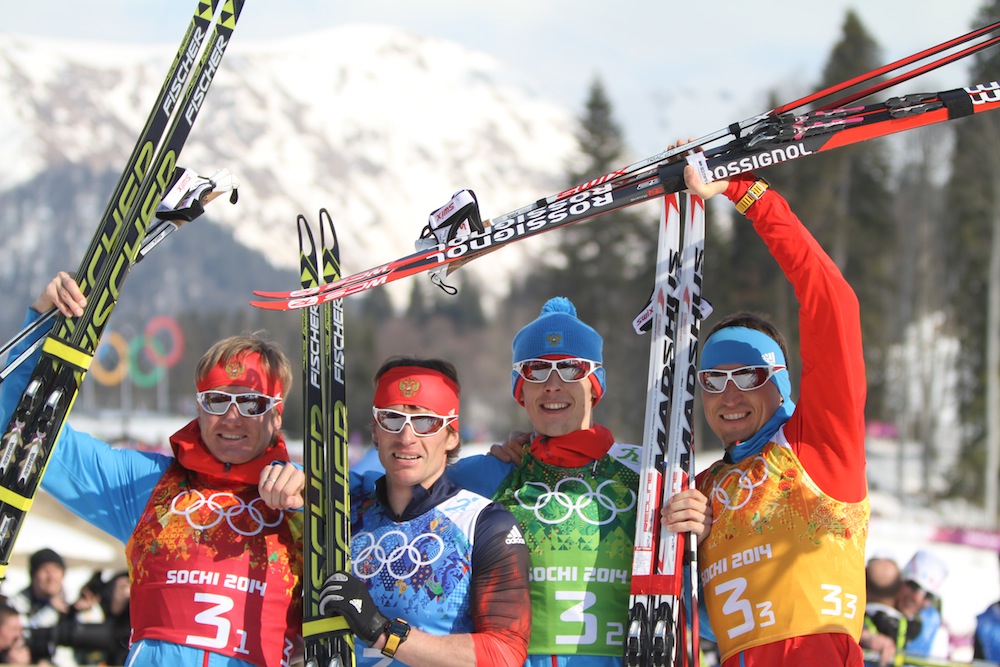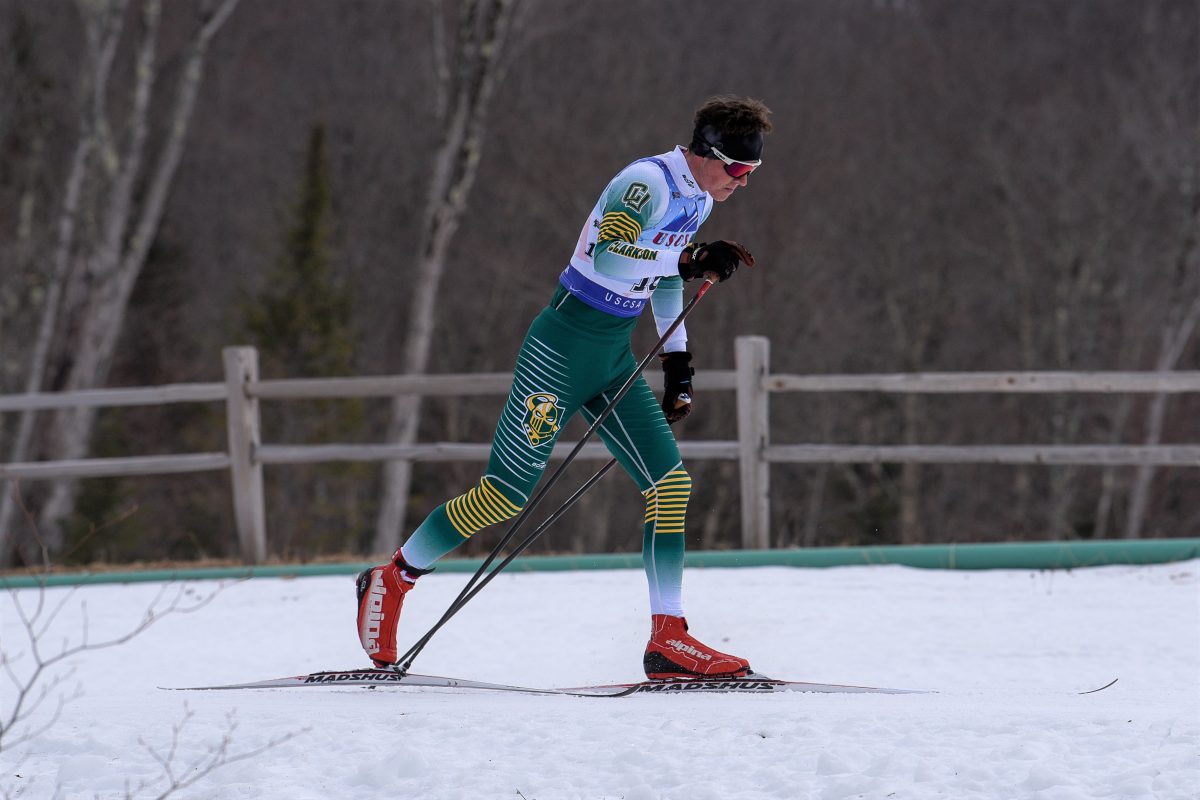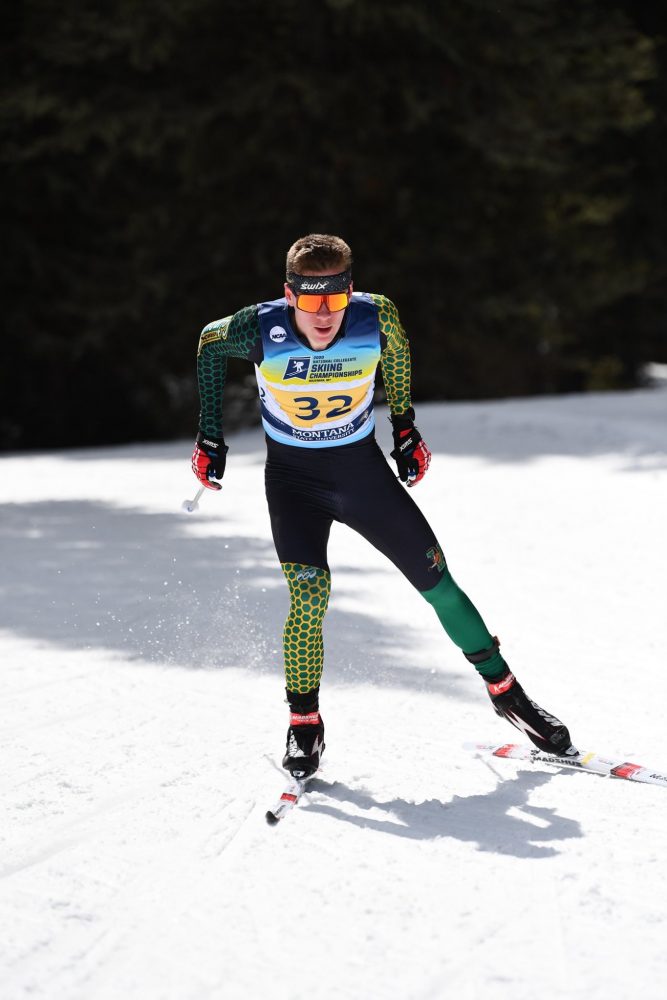
Note: On. Nov. 23, the day before the first World Cup race of the season, the FIS Doping Panel released a statement regarding the FIS eligibility of the six Russian skiers specified in the following article.
In the last two weeks, the International Olympic Committee (IOC) has disqualified six Russian cross-country skiers from the 2014 Olympics and barred them from ever competing in a Games again.
This weekend, one of them – Maxim Vylegzhanin – was competing in pre-World Cup races in Muonio, Finland, where he collected fifth- and sixth-place finishes.
That is because although the athletes were banned by the IOC, the International Ski Federation (FIS) has not made any changes to the athletes’ status.
“It’s troubling that certain athletes are now banned from ever competing in IOC events in the future, yet are seemingly allowed to compete on the FIS circuit unimpeded,” Canadian Olympian Devon Kershaw wrote in an email (which is printed in full at the end of this piece). “I feel this is unprecedented. Talk about confusing. The Olympics themselves are FIS sanctioned races.”
Vylegzhanin isn’t banned by FIS, and so he’s not breaking any rules by racing in non-Olympic competitions. Likewise, Alexander Legkov, also banned by the IOC but not by FIS, will race in Gällivare, Sweden, this weekend, along with three other athletes in the same situation.
“I’m not ashamed to look into the eyes of athletes, going to the start line, I did not break any rules and my conscience is clear!” Vylegzhanin wrote in an Instagram post.
“We can not comment on it,” Gällivare organizing committee member Stefan Nieminen told Sweden’s SVT broadcaster. “They are free to compete, it is not our decision or our problem to handle that issue.”
It has led to something of a delicate balancing act for his competitors, many of whom have competed next to these athletes on the World Cup for years.
“What I mean when I say it’s not personal is I don’t feel like we need to take the punishment into our own hands and ostracize him on the World Cup or anything like that,” American skier Noah Hoffman said, when asked specifically about Vylegzhanin. “I want to see FIS take action. I don’t want to see extrajudicial action in the sense that it’s not overseen by the organizations that oversee the sport. I want to see the organizations that oversee the sport take adequate action.”
How Did We Get Here?
Previously, the six skiers had been provisionally suspended while investigations into systematic doping by Russia at the 2014 Olympics were ongoing. The athletes appealed to the Court of Arbitration for Sport (CAS), and FIS was given until Oct. 31 of this year to bring a case against the six, or else let their suspensions lapse – in effect, the athletes couldn’t be held in limbo forever.
Oct. 31 came and went, and the IOC’s Disciplinary Commission ruled against the athletes in early November (Nov. 1 for Alexander Legkov and Evgeniy Belov, and Nov. 9 for Vylegzhanin, Alexey Petukhov, Julia Ivanova, and Evgenia Shapovalova).

Despite the change in the athletes’ status, FIS says that this does not constitute new evidence that would justify further provisional suspensions or an anti-doping rules violation (ADRV).
“The FIS Doping Panel is obliged to wait until the reasoned decisions are provided by the IOC Disciplinary Commission before it can undertake further action,” FIS Anti-Doping Administrator Sarah Fussek wrote in an email to FasterSkier. “This is a consequence of the CAS decision that the provisional sanctions of the Russian cross-country athletes would expire on 31st October and can only be reinstated if there was more specific evidence of individual anti-doping rule violations.”
In the CAS press release announcing the Oct. 31 deadline for FIS to bring a case against the skiers, the court only wrote that “a further provisional suspension may be imposed on the athletes by the International Ski Federation (FIS) after that date, if the facts and circumstances so merit, and would be subject to appeal.” No further specification was made in terms of what type of evidence would be required to impose another provisional suspension.
Fussek wrote that the IOC sanction on the athletes did represent a change in circumstance, but that it was not enough to impose a suspension.
“The fact that the IOC banned Russian athletes constitutes a change of the status of these athletes,” she wrote. “The IOC decision is a consequence of the assessment of the available evidence by the IOC Disciplinary Commission but does not by itself justify the imposition of a new provisional suspension by the FIS Doping Panel (FDP). The decision of the IOC DC is subject to appeal to the CAS. Before the FDP will independently review the matter of another provisional suspension (or a decision on the merits), it must know and examine the reasons on which the IOC DC based its decision.”
However, Fussek confirmed that both she and Stephan Netzle, FIS’s Legal Counsel, were present at the IOC Disciplinary Commission’s hearings for the athletes.
According to Russian Cross-Country Ski Federation President Elena Valbe, the hearing took ten hours. In the press, Valbe said that a commission from the University of Lausanne discussed finding scratch marks on sample bottles used for anti-doping work at the 2014 Olympics, saying that “they found that there were [marks] from specific people, some of our athletes had it… today there were results on salt [in the urine sample] of Julia Ivanova… there is a salt excess, it’s unclear how it got there, it’s all amazing.”
While FIS had representatives at the same hearing that Valbe discussed, they are awaiting the “reasoned decision”, a longer, written explanation, before acting.
“The FIS Doping Panel will afford the athletes the right of due process to examine the reasoned decision of the IOC before it will proceed,” Fussek wrote. “Until then, the Russian athletes, who are subject to a very rigid and tight doping control regime, will be admitted to competitions.”
In a follow-up email, she explained that Legkov had been tested 10 times by FIS in 2016-2017; Belov 12 times; Petukhov six times; Vylegzhanin 13 times; and Shapovalova nine times. Ivanova has retired and is out of the testing pool.
Athlete Reactions
Several athletes told FasterSkier that the Olympics is the biggest sporting event in the world, and it was most important to them that athletes who had cheated at past Games be excluded from the Olympics.

“My view is that you have to pick your battles,” Alex Harvey, the Canadian who won World Championships gold in the 50-kilometer mass start last season, wrote in an email. “And this year the big battle is the Olympics, and I’m glad that the IOC was strong enough against doping to ban these six Russians from the Olympics, so there’s that battle.”
“I think the most important thing is the Olympic sanctions because the Olympics are so much more important than anything else,” American 2014 Olympian Hoffman said.
But from there, their views diverged.
Harvey believed that FIS had not found enough evidence to ban the athletes, despite their IOC bans.
“I feel like I have a decent understanding of the law since I’m six courses away from finishing my law degree, and I read the CAS judgement that said FIS couldn’t extend the temporary ban on those six Russians unless they came up with additional evidence, which, so far, didn’t happen,” he wrote. “I think it’s important to understand that this is a precedent that the IOC (and FIS for the temporary ban they gave those six Russians last winter) is/are setting. Never before in our sport have we seen athletes get a doping ban from an infraction other than a positive test, even though there are more ways to ban an athlete than just a positive test.”
Hoffman, however, didn’t understand why evidence that was sufficient for a ban by the IOC would not lead to a ban by FIS.
“The answer I want from FIS is, why does the IOC have enough evidence and FIS does not?” he asked. “Where is the disconnect coming from? And I don’t know the answer to that… I believe in a punishment that fits the crime, but that’s a punishment from every organization involved, not just the IOC. I’m glad the IOC is taking action because I believe it’s necessary to ensure clean sport in the future and that’s the most important thing, right? We can’t change the past, but we want to ensure clean sport in the future.”
Hoffman said repeatedly that for him, the issue of whether the Russian athletes should compete or not was “not personal.”
“How will I feel about racing against Vylegzhanin, for instance, on the World Cup this year?” he asked. “The answer is, for me as an athlete, I’m still just focused on what I can control and what I’m doing, and he’s just one more person within the field and I know the World Cup field is going to be strong… But then it does get personal when you look at last year. I missed the objective criteria for the U.S. Ski Team by one point and one place [on the World Cup distance list], and three places ahead of me was Legkov. Individual spots and individual points do matter, but I’m just focusing on what I can control.”
When asked about FIS’s handling of the situation, U.S. skier Kikkan Randall, who was formerly the FIS Athlete Representative for cross-country skiing, wrote, “I’m not the Athlete Rep any more so it’s not my place to comment on this. I’m also about ready to start racing and that’s where my focus is.”
Kershaw’s Take
When contacted about competing against Vylegzhanin, Canada’s Devon Kershaw wrote the following response.

“The entire situation regarding this scandal is flabbergastingly odd. The findings in the three major ‘investigative reports,’ with Parts #1 and #2 of the McLaren report issued by [the World Anti-Doping Agency], and then the Oswald commission by the IOC, have caused a maelstrom in the cross country ski world. With good measure to be sure, but at the same time the dysfunction that this situation has unveiled is troubling.
“’The Russians athletes, who are subject to a very rigid and tight doping control regime…’ is a cute response from FIS. Lance Armstrong was also subject to a rigid and tight doping control regime, and never officially failed a test while he was an active athlete, and yet…
“The list of cyclists that are ‘subject to a tight doping control regime’ is long. But so too is the list of athletes like David Millar or Thomas Dekker, who also didn’t fail a test, getting banned. I know, they found actual EPO in David Millar’s apartment in France during a raid, and Thomas Dekker was one of the earliest athletes to be caught with the ‘biological passport’ but the facts remain that both they and others – Did. Not. Fail. An. Antidoping. Test.
“And may I ask who is supposedly overseeing the ‘doping control system?’ Researching and publishing the list of banned substances for example, or in charge of the whereabouts systems in place? WADA? And didn’t WADA publish two explosive reports laying out some pretty troubling findings?
“What is going on? That’s my question for FIS. It’s troubling.
“Troubling in the fact that certain athletes are now banned from ever competing in IOC events in the future, yet are seemingly allowed to compete on the FIS circuit unimpeded. I feel this is unprecedented. Talk about confusing. The Olympics themselves are FIS sanctioned races, haha.
“I wish that with all these competing governing bodies with stakes in this (IOC, WADA, FIS) could come to a consensus and do it soon. The image and integrity of our sport could be likened to that of a dumpster fire; raging with the sickly stench of incompetence. Fans, athletes, staff, sponsors, all are left scratching their heads going ‘is this shit for real?’ and trying to understand how athletes can be banned, have their medals stripped for breaking doping rules and yet also be free to compete because ‘they are subject to a very rigid and tight doping control regime.’ I just cannot see something like this happening in other sports that have had similar issues (cycling comes to mind, or track and field for example).
“Am I happy to compete against the IOC banned Russians? Is it bad to say I don’t really care? I mean, me personally, as an aging athlete that week-in, week-out has been fighting between 10th and 85th in World Cups of late, I don’t exactly have a whole lot of clout. Caring changes nothing. BUT – what I would like to see is some continuity and clarity. That – or I’d like to see major funding partners leave FIS. Because at the end of the day, money talks. Cross country skiing is a tiny sport globally. Is this really what FIS wants the story to be? Apparently they don’t really care or are paralyzed at the moment, but maybe if their TV contracts, sponsors, etc., started asking the same questions WADA and the IOC are asking (by threatening to pull funding), perhaps we could get a clear answer out of FIS with this. Something grandiose seemingly needs to happen before change occurs. If not, this will be the story our sport carries at the forefront of the ‘biggest show on earth’ come February in Korea.
“And that would be sad, because there are a lot of beautiful stories that will be lost along the way. Stories that could help and inspire others.
“What I do care about is the sport of cross-country skiing. I believe unequivocally in the importance of clean sport. I want to see our sport thrive and succeed. This mess needs to be straightened out. I call upon those with the means and the information to please get to the bottom of this before our tiny sport becomes damaged further. It shouldn’t be this difficult and opaque.”
Chelsea Little
Chelsea Little is FasterSkier's Editor-At-Large. A former racer at Ford Sayre, Dartmouth College and the Craftsbury Green Racing Project, she is a PhD candidate in aquatic ecology in the @Altermatt_lab at Eawag, the Swiss Federal Institute of Aquatic Science and Technology in Zurich, Switzerland. You can follow her on twitter @ChelskiLittle.




